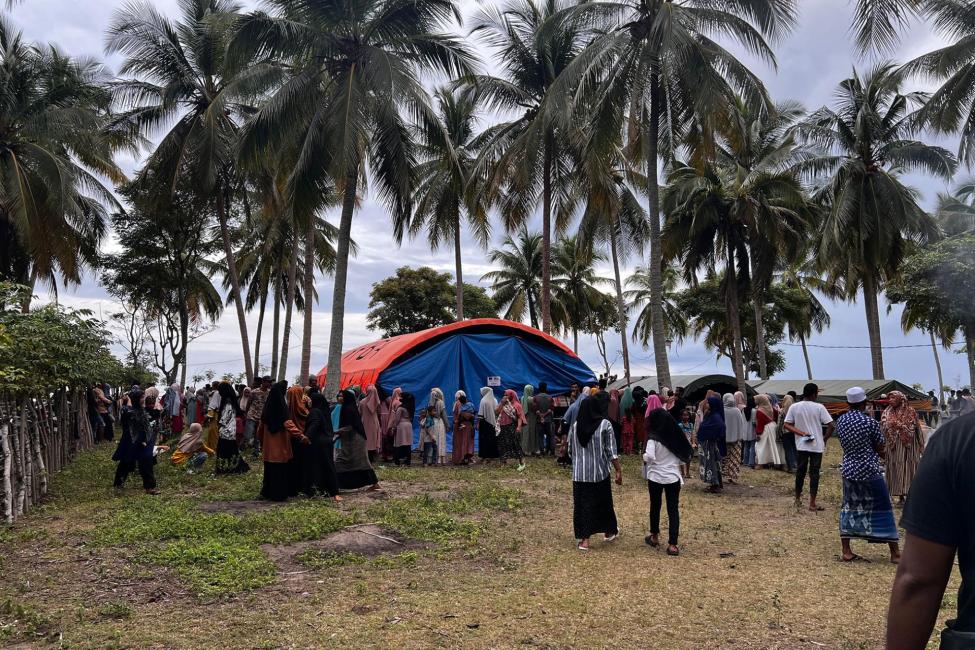-
Who we are
WHO WE AREThe International Organization for Migration (IOM) is part of the United Nations System as the leading inter-governmental organization promoting since 1951 humane and orderly migration for the benefit of all, with 175 member states and a presence in over 100 countries. IOM joined the United Nations system in September 2016.
About
About
IOM Global
IOM Global
-
Our Work
Our WorkAs the leading inter-governmental organization promoting humane and orderly migration, IOM plays a key role to support the achievement of the 2030 Agenda through different areas of intervention that connect both humanitarian assistance and sustainable development.
Cross-cutting (Global)
Cross-cutting (Global)
- Data and Resources
- Take Action
- 2030 Agenda
Need for Financial Assistance Grows as 5.1 Million People Remain Internally Displaced Across Ukraine
Geneva/Kyiv – Nearly 5.1 million people are estimated to be displaced across Ukraine according to the International Organization for Migration’s (IOM) latest internal displacement report. A further 4.76 million people have returned home from displacement, of which 1.1 million have returned from abroad. Steadily increasing since the start of the full-scale war, eighty per cent of the displaced population cited financial assistance as a key need.
“With so many people displaced for a year or more, savings have been depleted and vulnerabilities compounded, undermining the resilience of war-affected Ukrainians,” said Anh Nguyen, IOM Ukraine Chief of Mission.
“Nationwide, less than half of those displaced are currently employed. Financial distress influences the decisions that displaced households make about their futures – whether to relocate, return or integrate,” he added.
The longer displacement lasts, the more vulnerable a person becomes and without adequate finances, they have little-to-no agency over the durable solution to their displacement, namely integration or return. Lack of employment opportunities in a displacement location, for example, means that a displaced family is less likely to integrate into that community. Failure to integrate could contribute to increased reliance on negative coping mechanisms or lead to pre-mature returns before it is safe to do so.
Alarmingly, 65 per cent of internally displaced people live in households with a monthly income level per household member equal to or less than 4,666 UAH [126 USD], the real subsistence minimum. The data provides evidence of growing inter-group tension in communities across Ukraine, especially as related to different levels of eligibility for social and humanitarian assistance.
Around a quarter of the internally displaced population reported that they were considering leaving their current location, and 3.3 million people intend to eventually return. The primary reason being the desire to resume a normal life or missing home and other sentimental reasons (64%), followed by the intention to reunite with their family (25%), owning a property in the place of origin (22%), economic reasons such as the possibility of earning an income (21%) and low perception of security in the current location (3%).
Nearly half returned from another region within Ukraine, with a further third returning from displacement within their own home region, most notable Chernihiv, Mykolaiv and Kharkiv regions. The top three regions where people are returning to are Kyiv City, Kyiv and Kharkiv regions, while the areas they are returning from include Kyiv City, Lviv and Vinnytsia region.
Of the 1.1 million who reported returning from another country, most returned from Poland (39%), followed by Germany (9%), Italy (7%), Czechia (6%) and Bulgaria (5%).
Fifty per cent of all the people who remain internally displaced are concentrated in just five regions, namely Kharkiv, Dnipropetrovsk, Kyiv and Odesa regions and Kyiv City – these regions have remained the top five hosting locations since January 2023. More than a quarter of displaced persons have stayed within their home region or even district when possible, hoping to return once safe enough to do so or without means to travel further. The majority of displaced people originated from eastern Ukraine.
This displacement data was gathered by IOM through an assessment of Ukraine’s general population at the end of May 2023 to gather information on displacement, mobility flows, intentions, and conditions to inform targeted assistance to the war-affected population. The data is an essential resource for understanding the extent of displacement across Ukraine, and contributes to research of the motivations, intentions, needs and conditions of those affected by displacement.
The work carried out by IOM’s data and analytics team in Ukraine is made possible through generous support from the European Union and the Governments of Canada, Korea, the United Kingdom, Germany, France and Belgium.
***
For more information, please contact Olivia Headon, Tel: +353833022648, Email: oheadon@iom.int

